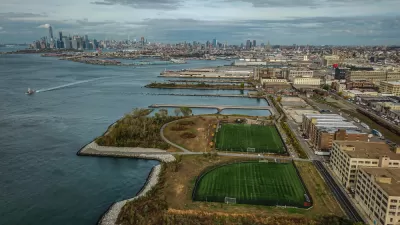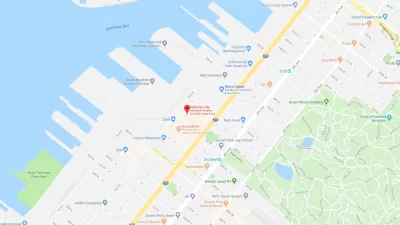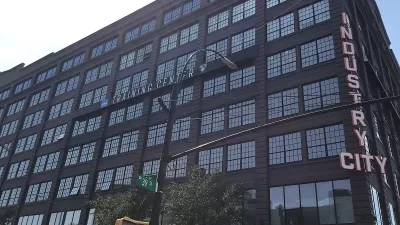Gentrification and displacement concerns won the day over a plan to rezone a former industrial area in Sunset Park, Brooklyn for new retail, offices, hotels and restaurants.

"Plans to rezone Industry City are, once again, dead on arrival — should the developer decide to move forward," reports Kathryn Brenzel from Brooklyn.
The grim reality for the project hit home after local councilmember Carlos Menchaca recently announced strong opposition to the project, proposed by developers Jamestown, Belvedere Capital, Cammeby’s International and Angelo, Gordon & Co.
The plan would have rezoned a 35-acre complex, which once housed heavy manufacturing, to expand its current capacity of retail, offices, hotels and restaurants. "Due to the coronavirus, the process has been halted since March and is expected to restart in September," according to Brenzel.
In New York City land use politics, the larger City Council usually acts in solidarity with a local councilmember's preference on project approvals to preserve each councilmember's own local veto power, according to Brenzel.
According to a separate article on the same subject by Karina Piser, "The outcome is the culmination of more than a decade of community organizing and lobbying by grassroots groups advocating for environmental justice and against gentrification. Chief among them are Uprose and Protect Sunset Park, which organized rallies, distributed petitions, coordinated community strikes, pressured Industry City executives directly, and hosted workshops and information sessions."
If you noticed a resemblance between this controversy and the defunct plan to welcome the second headquarters of Amazon to Long Island City in Queens, you wouldn't be the first.
The developers have yet to officially pull the rezoning application, and a project spokesperson quoted by Brenzel seems to indicate the developer's hope that "City Council Speaker Corey Johnson would negotiate a rezoning and marshall support from Menchaca’s colleagues to approve it."
FULL STORY: Industry City rezoning is effectively dead

Planetizen Federal Action Tracker
A weekly monitor of how Trump’s orders and actions are impacting planners and planning in America.

DARTSpace Platform Streamlines Dallas TOD Application Process
The Dallas transit agency hopes a shorter permitting timeline will boost transit-oriented development around rail stations.

Four Reasons Urban Planners Can’t Ignore AI
It’s no longer a question of whether AI will shape planning, but how. That how is up to us.

Bikeshare for the Win: Team Pedals to London Cricket Match, Beats Rivals Stuck in Traffic
While their opponents sat in gridlock, England's national cricket team hopped Lime bikes, riding to a 3-0 victory.

Amtrak’s Borealis Exceeds First Year Ridership Expectations
205,800 passengers have boarded the St. Paul to Chicago line, well above initial MDOT projections.

Study: 4% of Truckers Lack a Valid Commercial License
Over 56% of inspected trucks had other violations.
Urban Design for Planners 1: Software Tools
This six-course series explores essential urban design concepts using open source software and equips planners with the tools they need to participate fully in the urban design process.
Planning for Universal Design
Learn the tools for implementing Universal Design in planning regulations.
City of Mt Shasta
City of Camden Redevelopment Agency
City of Astoria
Transportation Research & Education Center (TREC) at Portland State University
US High Speed Rail Association
City of Camden Redevelopment Agency
Municipality of Princeton (NJ)





























